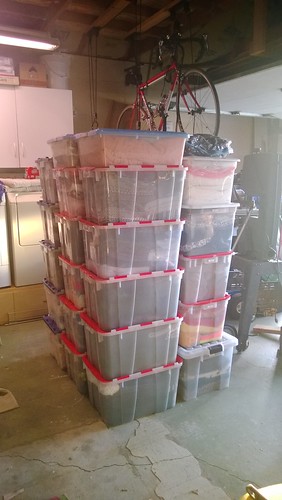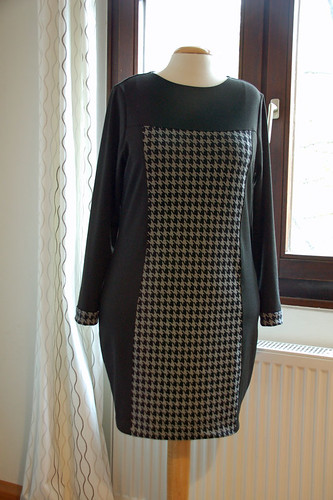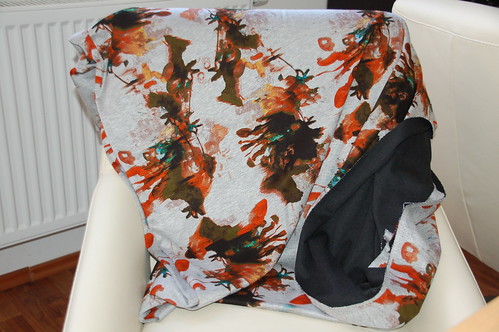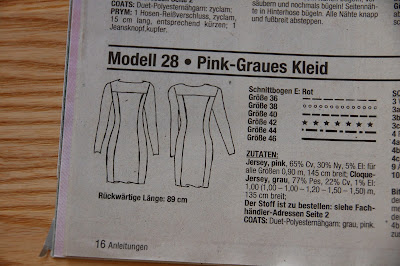I decided to make a (wearable) muslin after all, but it's of the shirt version of the pattern and not the whole dress. But before I get to that, I will tell you that I have decided not to use the Paris fabric for the print-blocked dress. Here's what happened to make me decide this:
I needed serger thread to better match the muslin fabric so I visited my local fabric stores. I am incredibly fortunate to have not one, but
two fabric stores right around the corner. I swear I didn't know about them when we were apartment hunting so that's not why we rented this apartment! At the first store, I was surprised to find almost the exact same fabric that I'd bought in Paris. They had a different colorway than I'd bought and it was a couple euros cheaper per meter. I like the color I bought so I don't feel bad in the least that I paid more, and we're only talking 4 euros total. They have gorgeous fabrics there, but not the serger thread I wanted so I walked over to store #2.
Store #2 didn't have the serger thread either (or the Paris fabric for that matter) but they did have lots of other beautiful fabrics and one in a particular that I think I may use for this dress instead of the Paris fabric. The Paris fabric has a little bit of shine on the print side that doesn't exist on the backside. Since I was planning on using the black, reverse side as an element, I'm not sure I like the mixture of textures. Better to think of this now before I start cutting! I have another idea for the Paris dress though. But I'm intent on making the print-blocked dress, so I think I may have to go back to Store #2 for some fabric.
While I was in Store #2, I did a double take. Another customer had the same
Sabrina Woman magazine opened to the same print-blocked dress I'm making! I guess it's a popular style. If I spoke and understood German better I would have said something like "I'm making the same dress". Hmmm, that would be something like:
Ich nähe das gleiche Kleide. But then she would have replied something in German and I'd be lost and have to admit that I (still) don't know much German. Anyways...back to sewing.
So I decided to make a test garment. While attempting to trace off the pattern for the dress I realized that there was a simpler version of the pattern as a shirt. I have to pause for a moment to say that I thought Burda magazine patterns were tough to trace, but these magazines are worse, and not just because all the notation is in German. The pattern sheets are half the size so they end up having to provide extension pieces for dresses and pants. I'm pretty sure there's an error in the dress pattern too. I traced off the front pieces and added in the extension, but the back piece extension did not work out at all. After squinting for a long time at the tiny numbers and spaghetti of lines and symbols, I concluded that there must be an error, and the best thing to do would be to ignore the extension and just add the length I need. But that's when I decided that I should make a muslin first. Mixed in with the dress pattern was an option for a top. The key elements of fit were there: bust, waist, hip and sleeve, so it made sense to make the top first. Here it is:
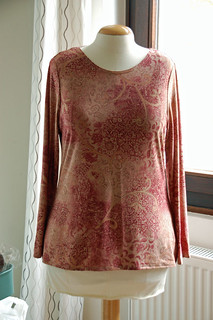 |
|
Pattern used: Model #38 from
Sabrina Woman (German) issue 3/13. This is the same issue as
Modellina (Italian) 152,
Elena Couture (France) 62,
Fashion Trends (Netherlands) 11, and
Tendencias de Moda (Spain) 11.
Sizes: European 36-46. I made my usual alteration of a 42 in the bust/shoulders to a 46 in the waist/hips.
Alterations: I lowered the neckline by 4 cm.
Construction: I didn't use the instructions in the magazine because this was very simple to construct. The hardest part of making this top, besides tracing the pattern, was changing my serger back and forth between overlock and coverstitch. I used fusible stay tape in the shoulder seam, and then serged the shoulders. Next I serged the sleeves - I find it much easier to put sleeves in flat on knit tops. I turned the neck edge under and used a coverstitch. Then I serged the side and sleeve seams and used the coverstitch for the sleeve hem and bottom hem.
Fabric: I used a polyester knit fabric I brought to Germany from my stash. My stash-card says I bought it at Fabrix in San Francisco, so I probably only paid about $3 a yard. The fabric is slightly sueded on the outside, so it's nice and soft but the reverse side has a slick finish. It feels cool to the skin, and I'm not sure if that is a good thing or not.
Likes and Dislikes: I like the fit of this everywhere except the bust. The draglines you see on the dressform don't show up that way on me, instead there is some pulling at the sides of my bust. I didn't do a full bust adjustment (FBA) but those draglines tell me I need one. I am glad I graded out to the larger size in the waist and hips. The shirt floats over my fluffy parts without being too big. The key thing I was looking for in this wearable muslin was the fit over my waist and hips and it works, so I think I'm good to go. I also like the fit through the shoulders and neck.
Lessons learned:
- If you let too much time go between sewing projects, you might forget how to use your tools! I was glad I brought my manual on how to set up the serger.
- Test your stitch in the same manner as you will be sewing it. I always do a test serge on a scrap of fabric to make sure the stitch is correct. When I tried the coverstitch, it tunneled terribly! I re-thread the machine, double checked the settings, and even looked for advice online. In the end the problem was simple: I tested the coverstitch on a single layer of fabric...when I folded the fabric as it would be for the actual hem, the coverstitch was just fine.
- Resist the urge to procrastinate. I had finished everything but the sleeve and bottom hems and was tempted to stop there and stick it on the dressform. But I know me - it would take great effort to get back to finish those hems, especially if I moved on to another project and re-threaded the machine. So I pushed on and now I have a completed garment.
- I'm glad I returned to sewing. It made me happy to create a new top to wear, and I loved hearing the whir of the sewing machine again.
So I think I'm ready to go for the dress. I just need to do a small FBA and depending on the thickness of the fabric I buy I might add a little more width to the sleeves.
